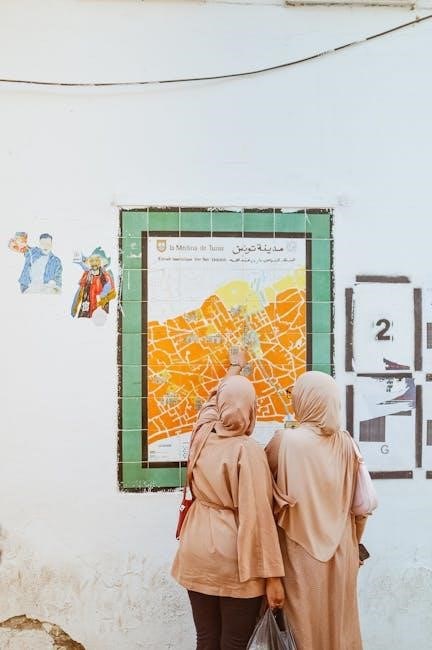This guide provides a comprehensive framework for understanding the complexities of Black relationships, focusing on historical context, emotional landscapes, and communication strategies to foster healthier connections․
Overview of the Book’s Purpose
This guide aims to enlighten Black men and women about the complexities of their relationships, addressing historical trauma, emotional insecurity, and societal influences․ It seeks to foster empathy, mutual understanding, and positive change by exploring the deep-rooted challenges and offering practical strategies for building healthier, more resilient partnerships within the Black community․
The Author’s Perspective and Intent
The author approaches the topic with a blend of historical analysis and cultural insight, aiming to bridge understanding between Black men and women․ By addressing emotional insecurities and societal impacts, the book seeks to challenge stereotypes and promote positive change, offering a nuanced exploration of relationships rooted in empathy and mutual respect․
Historical Context of Black Relationships
Historical events, such as slavery, have deeply shaped the dynamics of Black relationships, influencing emotional and societal challenges that persist today․
The Impact of Slavery on Black Relationships
Slavery profoundly disrupted Black relationships, causing lasting emotional and societal challenges․ Forced separation, dehumanization, and systemic oppression created dysfunctionality, fostering mistrust and insecurity․ These historical wounds continue to influence dynamics, shaping contemporary struggles in communication, intimacy, and mutual understanding between Black men and women, highlighting the need for healing and awareness in modern relationships․
Evolution of Black Relationships in Modern Times
Modern Black relationships navigate a complex interplay of societal shifts, cultural movements, and evolving identities․ Increased media representation and open dialogues about mental health and gender roles have fostered growth․ While historical traumas persist, there is a growing emphasis on mutual respect, empathy, and collaboration, laying the groundwork for healthier, more equitable connections in contemporary Black relationships;

Understanding the Black Woman’s Emotional Landscape
The Black woman’s emotional landscape is shaped by historical trauma, societal marginalization, and cultural expectations, often leading to emotional insecurity and deeply rooted fears that influence relationships․
Emotional Insecurity and Its Roots
Emotional insecurity in Black women often stems from historical trauma, societal marginalization, and systemic oppression․ These experiences create deep-rooted fears and self-doubt, impacting trust and intimacy in relationships․ Understanding these origins is crucial for fostering empathy and mutual respect․
Fears and Their Contribution to Relationship Dynamics
Fears such as abandonment, rejection, and failure often arise from historical and societal challenges faced by Black women․ These fears can create defensive mechanisms and emotional barriers in relationships, affecting communication and intimacy․ Addressing these fears requires open dialogue and mutual understanding to build trust and strengthen bonds between partners․
Resilience and Strength in the Face of Adversity
Black women have historically demonstrated remarkable resilience, thriving despite systemic oppression and societal challenges․ Their strength stems from cultural identity, community support, and a deep-rooted ability to adapt and overcome adversity․ This resilience not only empowers individuals but also enriches relationships, fostering a foundation of mutual respect and understanding within the Black community․

Sociocultural Factors Influencing Black Relationships
Societal marginalization, cultural expectations, and identity shape Black relationships, creating barriers and fostering resilience․ These factors influence dynamics, requiring understanding and empathy to navigate challenges effectively;
The Role of Societal Marginalization
Societal marginalization has historically impacted Black relationships, rooted in systemic oppression and racial bias․ This marginalization fosters emotional insecurity and mistrust, affecting communication and intimacy․ Understanding these dynamics is crucial for healing and building stronger, more empathetic connections within the Black community․ Addressing these issues requires acknowledging their historical roots and fostering mutual respect and open dialogue․ Empathy and education are key to overcoming these challenges and creating a foundation for positive change in Black relationships, enabling both partners to thrive and support each other in the face of societal pressures․
Cultural Expectations and Their Effects
Cultural expectations impose pressures on Black relationships, shaping perceptions of gender roles and behavior․ These expectations often stem from societal norms, creating internalized beliefs about masculinity and femininity․ Such rigid frameworks can lead to misunderstandings and tension, as individuals may struggle to balance cultural identity with personal authenticity․ Open dialogue and mutual understanding are essential to navigating these challenges and fostering healthier connections․
The Influence of Identity and Self-Perception
Identity and self-perception play a crucial role in shaping interactions within Black relationships․ Historical and societal factors often influence how individuals view themselves and their partners, leading to internalized stereotypes or misconceptions․ Understanding these dynamics is key to fostering mutual respect and empathy, as it allows both parties to move beyond surface-level assumptions and connect on a deeper, more authentic level․
Communication Strategies for Black Men
Effective communication involves active listening, empathy, and clarity․ Black men can foster deeper connections by expressing emotions openly and understanding non-verbal cues, enhancing mutual understanding․
Effective Listening and Empathy
Effective listening involves fully engaging with her words and emotions, creating a safe space for open dialogue․ Empathy bridges gaps, allowing Black men to understand her experiences deeply, fostering trust and connection․ By actively listening and showing compassion, misunderstandings dissolve, and mutual respect grows, enriching the relationship and strengthening emotional bonds․
Breaking Down Barriers to Open Dialogue
Breaking down barriers requires acknowledging historical and emotional triggers, fostering a non-judgmental space․ Active engagement and patience help dismantle defenses, allowing honest expression․ By validating her experiences and perspectives, Black men create a foundation of trust, encouraging open and meaningful conversations that strengthen the relationship and promote mutual understanding․
The Importance of Emotional Intelligence
Emotional intelligence is crucial for understanding and navigating the complexities of Black relationships․ It involves recognizing and validating emotions, fostering empathy, and maintaining self-awareness․ By actively engaging with her emotional landscape, Black men can create a supportive environment, ensuring open communication and mutual respect․ This fosters deeper connections and paves the way for healthier, more meaningful relationships․

Misconceptions and Stereotypes
Addressing misconceptions and stereotypes is vital for fostering understanding․ Historical baggage and media portrayal often distort perceptions, emphasizing the need for open dialogue and accurate representation․
Common Misconceptions About Black Women
Common misconceptions about Black women often stem from stereotypes like the “angry Black woman” or the belief that they are overly dominant․ These narratives, rooted in historical marginalization and media portrayal, overlook the complexity of their experiences; Understanding these misconceptions is crucial for fostering genuine connections and breaking down barriers in relationships․
Addressing Stereotypes in Media and Society
Stereotypes about Black women, such as the “angry Black woman” or the “strong, independent trope,” are deeply ingrained in media and society․ These narratives often oversimplify their experiences and perpetuate misunderstanding․ Addressing these stereotypes requires challenging their origins and promoting authentic representations to foster mutual respect and healthier relationships within the Black community․
Historical Baggage and Its Impact on Relationships
Slavery, segregation, and systemic oppression have left deep scars, influencing relationship dynamics․ Forced separations, emotional trauma, and societal conditioning fostered mistrust and resentment․ Historical baggage manifests as unresolved pain, affecting communication and intimacy․ Understanding this legacy is crucial for healing and building stronger, empathetic connections within the Black community․
Navigating Modern Black Relationships
Modern Black relationships face unique challenges, including societal expectations, communication gaps, and evolving roles․ Navigating these requires mutual respect, empathy, and a deep understanding of shared experiences and cultural nuances․
Challenges of Contemporary Dating
Contemporary dating for Black individuals faces challenges like societal stereotypes, emotional baggage, and communication barriers․ Historical traumas, such as the legacy of slavery, contribute to mistrust and intimacy issues․ Modern societal pressures, including marginalization and unrealistic expectations, further complicate relationships․ Addressing these challenges requires open dialogue, mutual understanding, and a willingness to break cycles of dysfunction rooted in systemic oppression and cultural norms․
The Role of Mutual Respect and Understanding
Mutual respect and understanding are foundational to healthy Black relationships․ They involve acknowledging each partner’s experiences, perspectives, and emotional depth․ By fostering empathy and open communication, couples can navigate challenges and build trust․ Respect also means valuing individual identities and contributions, creating a safe space for growth and connection, which strengthens the bond between Black men and women․
Building a Foundation for Healthy Relationships
A strong foundation for healthy relationships involves communication, trust, and shared values․ By addressing past wounds and fostering emotional intelligence, Black couples can create a supportive environment․ Mutual respect and understanding are key, allowing both partners to grow together and overcome challenges, ultimately fostering a resilient and loving relationship built on empathy and connection․
The Role of Empathy and Mutual Respect
Empathy and mutual respect are cornerstones of understanding, fostering deeper connections and healthier relationships․ They bridge gaps, encourage open dialogue, and promote a harmonious partnership rooted in compassion and shared growth․
Cultivating Empathy in Relationships
Cultivating empathy involves active listening and understanding each other’s experiences․ By acknowledging historical and societal impacts, Black men can foster deeper connections with Black women․ Empathy bridges gaps, allowing both partners to navigate challenges together, creating a foundation of trust and mutual respect․ This process enriches relationships, encouraging open communication and emotional intelligence, essential for lasting harmony and growth․
Respect as a Cornerstone of Understanding
Respect is the foundation of meaningful relationships, fostering trust and open communication․ By valuing each other’s perspectives and experiences, Black men and women can build a connection rooted in mutual appreciation․ Respect acknowledges individuality and shared history, creating a supportive environment for growth and understanding․ It ensures both partners feel heard and valued, strengthening the bond between them․

Practical Steps for Growth
Education, self-reflection, and support systems are essential for fostering growth․ Open dialogue and mutual understanding create a foundation for healthier relationships, empowering both partners to thrive together․
Education and Self-Reflection
Education is the foundation for growth, enabling individuals to understand historical and cultural contexts․ Self-reflection helps identify personal biases and emotional triggers, fostering empathy and mutual respect․ By exploring these aspects, Black men and women can gain deeper insights into each other’s experiences, paving the way for healthier, more meaningful relationships rooted in understanding and shared growth․
Support Systems for Black Men and Women
Building strong support systems is crucial for fostering growth and understanding․ Community networks, cultural groups, and educational initiatives provide platforms for open dialogue and shared learning․ These systems address emotional and societal challenges, empowering individuals to navigate relationships with empathy and resilience, while promoting collective healing and positive change within the Black community․
This guide culminates in a call to action, urging Black men and women to embrace empathy, mutual respect, and understanding․ It serves as a catalyst for positive change, fostering stronger, healthier relationships rooted in shared resilience and a deep appreciation for the complexities of the Black experience․
Key Takeaways for Black Men
Black men must acknowledge the historical and emotional depths of the Black woman’s experience, fostering empathy and understanding․ By addressing societal marginalization and communication barriers, they can build stronger connections․ Embracing mutual respect and emotional intelligence is crucial for creating healthier relationships and driving positive change within the Black community․
A Call to Action for Positive Change
This guide urges Black men to take proactive steps toward understanding and supporting Black women․ By challenging stereotypes, embracing empathy, and fostering open dialogue, they can contribute to a cultural shift․ Education, self-reflection, and collective efforts are essential for building a foundation of mutual respect and healthier relationships within the Black community․
